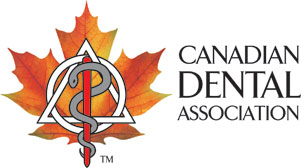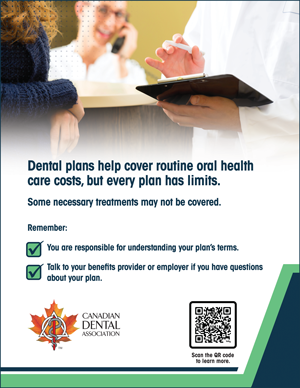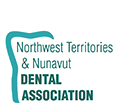Even though dental plan details might seem a bit complicated, having a dental plan can be quite helpful in reducing your out-of-pocket dental costs. It's important to know how your dental plan can help you and how it works. Whether you have a dental plan or not, the first step is always talking to your dentist to establish your dental health needs.

Why are dental benefits important?
- Dental plans can reimburse a significant percentage of your oral healthcare expenses. Plans help make dental care accessible for more Canadians.
- Oral health is part of your overall health. Your dental plan makes it easier to visit your dentist regularly. Regular visits can help you avoid oral health complications and keep a check on the risk factors that can affect your overall health.
- Well-designed dental plans allow plan beneficiaries to see their regular dentist and do not interfere with your treatment choices. They may not pay for all your required treatment but they will not prevent you from getting the care that you want.
What You Need To Know
To be a well-informed partner in your oral health care, be sure to keep these steps in mind.
- Know Your Dental Benefits: Understand your dental benefits plan before going to the dentist.
- Discuss Your Needs: Talk to your dentist about your oral health needs and the treatment options that are right for you.
- Choose Your Treatment: Agree on the treatment option that makes you feel most comfortable.
- Payment and Claims: Regardless of your dental plan coverage, you are responsible for the payment of your dental bill and for filing a claim to receive the reimbursement you are entitled to.
Understanding Your Coverage
- Your dentist may not know the specifics of your dental benefit plan. Read the information booklet or other materials available from your benefits provider.
- If you’re uncertain about how much your dental benefits plan will cover for recommended treatments, ask your dentist to submit a predetermination request. This will provide information on the reimbursement you might receive.
- All benefit plans have limitations, so necessary treatments may not always be covered. Remember that your dentist is treating you, not your dental plan.
- Decisions about your treatment should always be made between you and your dentist. Even though insurance companies can provide a predetermination to help you understand available reimbursement, they cannot make treatment decisions on your behalf.
How to Submit a Claim to Your Insurance Company
If you've told your dentist that you have dental coverage, after your appointment, your dental office will either give you a paper claim form to complete and send to your insurance company, or they'll ask for your permission to send the claim electronically.
Sending claims electronically often means you'll normally get confirmation of your reimbursement before you leave the office and it speeds up the payment process.
Whether submitted on paper or electronically, your claim includes a statement of the services completed during your appointment and the fee you need to pay - all prepared and certified as accurate by your dental office.
Private Dental Plans and Public Dental Programs
While individual dental plans exist, almost 90% of patients with private coverage are part of group plans or employer-sponsored programs. Employers usually buy group plans and offer them as part of their employees' compensation packages.
Some dental services are covered through public or government-funded dental programs. To find out if you are eligible for a public or government-funded dental program, please contact your local public health unit or view their websites, to enquire about services available in your local community. Services vary in each province and community.
A list of federal, provincial and territorial government dental programs is available in CDA's policy paper in Appendix D, or at the Canadian Association of Public Health Dentistry.
Helpful links:
Understanding Your Dental Benefits: A Handy Guide for Patients (Downloadable PDF. Best for viewing on your device.)
Understanding Your Dental Benefits: A Handy Guide for Patients (Downloadable PDF. Best for printing, folding, and keeping/handing out.)
Dental Plans: A Dentist’s Guide (Downloadable PDF. Best for viewing on your device.)
Dental Plans: A Dentist’s Guide (Downloadable PDF. Best for printing, folding, and keeping/handing out.)
Last updated: April 22, 2025













